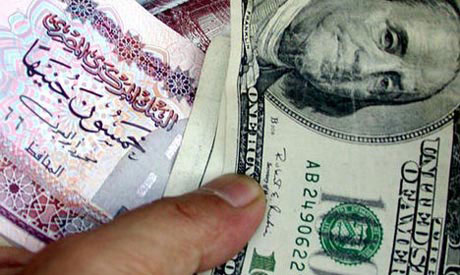
L.E Egypt pound falls to 8-year low (Photo: Reuters)
Despite recent declines in value of the Egyptian pound, analysts' short-term forecasts for the local currency are not particularly dark.
With the pound inching down to an eight-year low Wednesday, however, concerns about further devaluation cannot be ruled out.
Nevertheless, many local analysts remain upbeat.
Hani Genena, head of research at the Cairo-based Pharos Investment Bank, for his part, expects the pound to stabilise before the end of the current year.
"The recent slip in the pound's value can be attributed to the recent exit of many foreign investors from Egypt's stock market due to recent political turbulence," Genena told Ahram Online.
While a number of analysts had predicted a severe currency devaluation in the wake of last year's revolution, Genena had forecast – correctly, as it turned out – that the pound would remain stable.
In fact, since the popular uprising in early 2011 that culminated in the ouster of former president Hosni Mubarak, the pound has lost less than 5 per cent of its initial value, contradicting some of the more dire forecasts that the currency could decline by as much as 40 per cent post-revolution.
"We knew that Central Bank Governor Farouq Al-Oqda would work hard to keep the local currency stable," said Genena.
He went on to point out that a severe currency devaluation would be "catastrophic" for Egypt "because the revenue of numerous state entities – such as the Egyptian Petroleum Authority – is denominated in pounds, while all of their borrowing is in dollars."
Genena added: "A serious devaluation, therefore, would mean a jump in expenditures, along with greater balance-of-payments and budget deficits."
Genena went on to dismiss the correlation between the currency devaluation and recent visits to Egypt by IMF delegations. Some analysts have suggested that the recent devaluation was done intentionally by the government to signal its readiness to be flexible over currency values.
"The IMF supports currency devaluation with a view to reducing the budget deficit," said Genena. "But in Egypt, currency devaluation will have the opposite effect, as our imports far exceed our exports."
Analysts at Cairo-based Prime Securities, meanwhile, don't expect the dollar to exceed 6.2 Egyptian pounds by the end of the year.
"It's hard to forecast what will happen in coming years," Monette Doss, a researcher at Prime, told Ahram Online. "This will depend largely on foreign currency inflows."
Both analysts, however, acknowledge a link between Egypt's proposed $4.8 billion loan from the IMF and the pound's value.
"Once the loan agreement is concluded, investors will feel more confident about investing in Egypt," said Doss. "But nothing is certain. The situation could become really bad, or the central bank will be able to keep things under control."
Genena, for his part, expressed more optimism, saying that the pound could even increase in value in the event of higher-than-expected investment inflows.
Since last year's revolution, Egypt's net foreign reserves have been nearly halved, putting a significant dent in the country's business and tourism activity.
Short link: